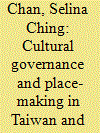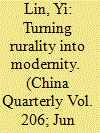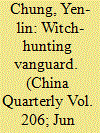|
|
|
Sort Order |
|
|
|
Items / Page
|
|
|
|
|
|
|
| Srl | Item |
| 1 |
ID:
105859


|
|
|
|
|
| Publication |
2011.
|
| Summary/Abstract |
This article describes agricultural technology extension, access to channels of information and adoption of agricultural technology in rural Guizhou, China. It addresses the questions of whether the agricultural technology extension process matches the needs of the villagers and whether in using extension services and adopting technologies there are differences between older and younger cohorts of farming households. Few farming households can get formal extension services and their main channels of information are neighbours, relatives and friends. Older cohort households like to learn by experience, while younger ones like to use written materials. There also appear to be differences in the ways women and men adopt technologies. Technology delivery and farming households' needs are not well matched. Finally, the migration context has an influence on the suitability of technologies and the feasibility of applying them.
|
|
|
|
|
|
|
|
|
|
|
|
|
|
|
|
| 2 |
ID:
105857


|
|
|
|
|
| Publication |
2011.
|
| Summary/Abstract |
This article compares cultural governance in Taiwan and China through their respective place-making processes. It investigates how cultural polices objectify tradition and popularize cultural landscape in local places for economic development and identity politics. Contrary to what would be commonly expected, the Chinese government adopted a minimalist approach while the Taiwanese government was much more hands-on. The sociopolitical histories of the two governments and their objectives are examined to understand this difference. In addition, the reactions of the locals to cultural policies in the two places are also contrasted. Finally, the different effects of cultural governance in China and Taiwan are examined. In particular, it was found that communal relations have deteriorated in China but strengthened in Taiwan as a result.
|
|
|
|
|
|
|
|
|
|
|
|
|
|
|
|
| 3 |
ID:
105856


|
|
|
|
|
| Publication |
2011.
|
| Summary/Abstract |
Between 1991 and 2001, Qian Xuesen, China's leading missile expert, was given an array of honourable titles by the state, followed by eulogistic narratives by the media and his biographers. This article analyses three forms of Chinese narratives about Qian: commendations from the state, stories told by his biographers, and Qian's self-presentation. It aims to show that although the CCP showered Qian with compliments seemingly because of his contributions to China's national defence and space programmes, the real reasons were Qian's political fidelity and the Party's aim to build a role model for intellectuals to emulate. The article demonstrates that Maoist practices of "hero construction" and using history for the present persist in the post-Mao period with some variations, and that the writings of "unofficial history" are heavily influenced by official history.
|
|
|
|
|
|
|
|
|
|
|
|
|
|
|
|
| 4 |
ID:
105855


|
|
|
|
|
| Publication |
2011.
|
| Summary/Abstract |
China promulgated the Open Government Information Decree and Measures of Environmental Information Disclosure (Trial) in 2007, but the Pollution Information Transparency Index revealed the poor implementation of disclosing environmental information in 113 cities in 2008. Adopting a comparative case study approach, this article uses a combination of the "cultural roots" and "webs of dialogue" analytical frameworks to analyse the pilot environmental information disclosure programmes in Zhenjiang, Jiangsu province, and Hohhot, Inner Mongolia from 1999 to 2000. It finds that when the programme was top-down, the commitment, perception and resources of leadership determined its success and nondisclosure did not receive any public attention. However, when environmental NGOs are actively engaged, pressure can be from the bottom up, webs of dialogue can be established, and the public can be empowered to seek and use environmental information actively in development decision-making and redressing pollution harms.
|
|
|
|
|
|
|
|
|
|
|
|
|
|
|
|
| 5 |
ID:
105854


|
|
|
|
|
| Publication |
2011.
|
| Summary/Abstract |
Drawing upon fieldwork conducted in a public school of largely migrant children in suburban Xiamen, south-east China, this article first looks into the formation of class lines between people with different backgrounds - migrant, urban or rural - against the suzhi jiaoyu programme of the school. This programme particularly targets the rural populace with a carefully and specifically selected curriculum and quantifiable techniques, in order to turn them into the self-individuated and homogenized subjects of China's modernization project. However, this article also argues that the coercive concept of suzhi has revealed internal contradictions that render any attempt at consensus on what plural qualities constitute capital Q Quality self-contradictory and ultimately less productive. Lastly, it suggests that suzhi may be better understood as an ever-ongoing project of meaning making that aims to form a body of knowledge in China's exploration of new paradigms of governance.
|
|
|
|
|
|
|
|
|
|
|
|
|
|
|
|
| 6 |
ID:
105858


|
|
|
|
|
| Publication |
2011.
|
| Summary/Abstract |
When the king went astray, the people suffered for it. Just as a wayward king needed loyal and capable courtiers to implement his wishes, so too did Mao Zedong in the People's Republic of China. The Anti-Rightist Campaign was one of Mao's controversial policies, and involved him delegating his trusted followers to implement his political initiatives. This article examines how the Central Secretariat, led by Deng Xiaoping, effectively implemented and strictly supervised the process, as well as the negative influences of the Central Secretariat on this witch-hunt-like campaign. It thus provides a case study of how the Central Secretariat operated and functioned as a powerful political apparatus in the political processes of the Chinese Communist Party during the pre-Cultural Revolution period.
|
|
|
|
|
|
|
|
|
|
|
|
|
|
|
|
|
|
|
|
|